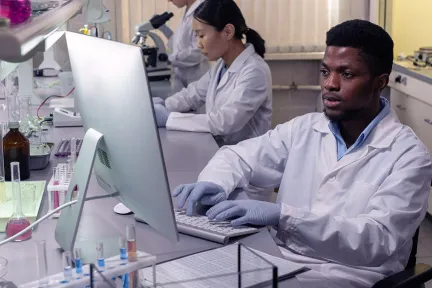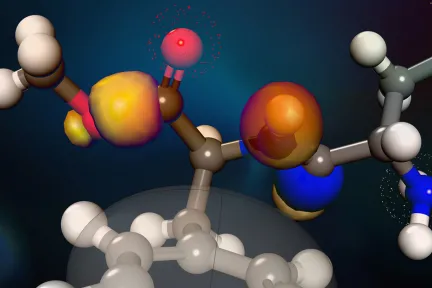Scientific Informatics
Transform Scientific Data into Knowledge
Innovation Through Scientific Collaboration
Scientific discovery arises from the collaboration of diverse teams. The types of content these teams utilize can be equally as diverse across disciplines such as cheminformatics, bioinformatics, proteomics, genomics, and more. Organizations must ensure that researchers have the tools they need to effectively analyze and share this content to maximize its impact.
Leveraging a common framework for managing scientific content helps facilitate an environment of collaboration across internal and external R&D networks. Researchers can easily aggregate, process and analyze data while rapidly sharing and discussing results. Scientifically-aware tools also help guarantee that researchers have the capabilities they need to explore their data more deeply. Together, such an environment facilitates innovation and helps researchers guide their work via data-driven decisions.
BIOVIA Scientific Informatics Key Benefits
Democratize Data
Maximize the value of AI and machine learning for everyone
Optimize Workflows
Automate processes to document, analyze and report scientific data
Leverage Purpose-built Solutions for Science
Utilize sophisticated, discipline-specific tools for data analysis
Foster Collaboration
Create and manage a common workspace for collaboration between internal and external teams
Discover Our Scientific Informatics Portfolio
Explore the range of Scientific Informatics solutions in our Portfolio
A SaaS Cloud Solution
BIOVIA Scientific Informatics solutions are available on the 3DEXPERIENCE platform to help enhance collaboration and provide a single environment for all scientific data and innovation.
Key Benefits:
- A unified data model that can be accessed by other BIOVIA and Dassault Systèmes solutions
- A cloud-native solution, deployed on data centers around the globe for sovereign data control
- Seamless workflows which reduce non-value added tasks
- Integrated collaborative tools and cloud data storage for centralized knowledge management
Explore BIOVIA Scientific Informatics Solutions Related to Your Professional Role
BIOVIA Scientific Informatics solutions are packaged as Roles to get you up to speed faster and work more efficiently with all needed applications available at your fingertips. Select a package that corresponds to your role in an organization.
Start Your Journey
The world of Scientific Informatics changing. Discover how to stay a step ahead with BIOVIA
FAQ about Scientific Informatics
Informatics is the science of processing data for storage and retrieval, often within a specific field of study. It combines aspects of computer science, information science, and various domain-specific applications to create, manage, and use information effectively. Here are some key aspects of informatics:
- Data Management: Informatics involves the organization, storage, and retrieval of data. This includes creating databases, ensuring data quality, and developing methods for efficient data access and manipulation.
- Information Systems: The design and implementation of information systems that can process and manage large volumes of data. This includes software development, system architecture, and user interface design.
- Data Analysis: Using statistical and computational techniques to analyze data. This includes data mining, machine learning, and other forms of predictive analytics to derive insights from data.
- Human-Computer Interaction (HCI): Understanding how people interact with information systems and designing user-friendly interfaces. This involves studying user behavior, designing intuitive interfaces, and ensuring accessibility.
- Domain-Specific Applications: Informatics is often applied within specific domains such as health (health informatics), business (business informatics), and social sciences (social informatics). Each domain has unique requirements and challenges.
- Emerging Technologies: Exploring new technologies and their applications in informatics. This includes areas like artificial intelligence, cloud computing, big data, and the Internet of Things (IoT).
Informatics and data science are related but distinct fields. Informatics deals with the application of information technology to various domains, focusing on how information systems interact with users and communities. Data science, on the other hand, focuses specifically on analyzing and interpreting data to derive insights, using techniques from statistics, computer science, and mathematics.
Also Discover
Learn What BIOVIA Can Do for You
Speak with a BIOVIA expert to learn how our solutions enable seamless collaboration and sustainable innovation at organizations of every size.
Get Started
Courses and classes are available for students, academia, professionals and companies. Find the right BIOVIA training for you.
Get Help
Find information on software & hardware certification, software downloads, user documentation, support contact and services offering














